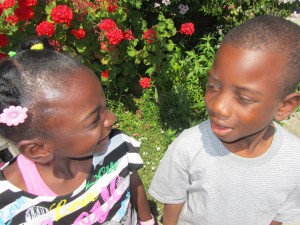

This sticky, murky, quirky aspect of parenting has slipped up on me; I didn’t see it coming. I suppose that’s because I’ve never been the parent of middle-aged children before. How could I know what I wouldn’t know? I’ve had a lot of lessons to learn the hard way on the parenting trail. One has been that no two children are alike, even though they’re raised in the same household, eat the same food, and interact with the same relatives and family friends—they might even be twins-but they‘re different one and all. What I now understand is that growing up in the same “pea pod” does not necessarily make all the “peas” the same. They can be as different as the difference between daylight and dark. How to knit them together in a close family bond, if that’s possible at all, is the puzzle every parent confronts and has to work through. Some are more successful at this than others.
Looking back over my life, I can think of several families that I knew during my childhood in which there were many children–lots of peas in one pod. At the time, I didn’t think much about how they interacted with each other; whether they were closely bonded, cooperative, protective of each other, or die-hard competitive adversaries. Since there were only two of us children in my immediate family, I can just remember wishing I had one more sibling—hopefully, a sister. My brother and I were definitely different; not “two peas in a pod” at all. It was almost as if we were born on opposite planets. Nevertheless, my parents, especially my mother, from time to time would compare the two of us as if we were equal. This usually happened at report card time; mine was good in the areas that mattered to Mother–his, not so much. It was as if grades were always a fair measure; which they’re not.
I was the academician. My brother was more mechanically inclined, and had little use for “book-learning”. His way of learning was to tear things apart, figure out what made them work, then put them back together again. Mother was sure there was something really wrong with him. She was not at all amused, for example, when he took her only clock apart to see what made it tick. As for me, I just wanted everything neat while I curled up with a good book or engaged myself in reading “Romance” magazines.
I was too young to discern its cause, but this practice on the part of my parents forced an invisible barrier to become erected between my only sibling and me. It’s only now, as we’ve reached our peak in life and are starting into the declining phases that we are able to sift through the debris of old hurts and talk openly about episodes, oh so long ago, in which those verbal comparisons took place and the damage they did. . . trouble is, the perpetrator is far away in Heaven, and can’t hear the stories; although I’m sure she didn’t mean any harm.
I don’t know whether a third child in our family would have made an iota of difference in the destructive pattern that adversely affected my brother, who viewed the remarks as criticism, but I do think it might have provided a buffer against the solitude he must have felt during those hurtful times. If there had been a third child, they might have collaborated on beating me up to get revenge. On second thought, maybe having that sister would not have been such a good idea!
Ironically, sometimes children are positively motivated by such parental comparisons. Who knew, for example, that my brother, who tore up everything then fixed them back, would one day own two automotive service stations and make lots of money tearing down cars to repair them? I, on the other hand, became a doctor; but, not the kind who could fix anything. All I can do is talk, talk, talk. Observing that example in my own life, I’m now convinced that God keeps notes and eventually balances things out.
As the mother of four now middle-aged adults, I sometimes find it challenging to hold discussions with individual siblings about the successes of the others. It’s hard to brag about one to the other—especially if things aren’t going so well for the one I’m speaking with. I have to be cautious, lest my comments be perceived as criticism. What they each want to hear is my praise for what they’re doing; and they’re doing plenty–from hiking to bungy diving, and everything in between– all at dizzying pace.
Nevertheless, I’ve learned that children, no matter what age, always want their parents praise above all else. It would be great if the only words in the English language were words of praise—then parents like me, who are inclined to “call a spade a spade”, would have little to say. Perhaps that would be a perfect solution to the problem.
Shirley Robinson Sprinkles is semiretired and lives with her husband in Austin, Texas. She is the author of From Dunbar to Destiny: One Woman’s Journey through Desegregation and Beyond and, Seven Keys to Successful Single Parenting which offers nuggets of wisdom that author Shirley Robinson Sprinkles gained rearing her four children, now all highly successful adults. For ordering online visit: http://www.wheatmark.com/bookstore/ or by phone: 1-888-934-0888 Ext 3
